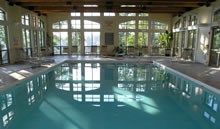Whether using dehumidification for industrial, commercial, residential, or swimming pool applications, customers must determine, if applicable, which of the two typical cooling system options will be the best fit for their application — air cooled or water cooled.

Air cooled dehumidifiers, for indoor pool room dehumidification and other projects, are the most common type and deliver warm dry air back to the space when operating. When room cooling is needed they are coupled with an optional outdoor remote condenser. This allows them to deliver warm dry air or cool dry air depending on what the controls call for.

 These methods are expensive to operate and wasteful, in that they constantly exhaust previously heated or cooled air outdoors. They also often fail to prevent structural damage caused by excess moisture, as the formation of mold and mildew in cold walls can cause irreparable damage.
These methods are expensive to operate and wasteful, in that they constantly exhaust previously heated or cooled air outdoors. They also often fail to prevent structural damage caused by excess moisture, as the formation of mold and mildew in cold walls can cause irreparable damage. A malfunctioning dehumidification system can cause mold and mildew build up quickly. This can lead to musty smells and poor air quality, not to mention structural issues.
A malfunctioning dehumidification system can cause mold and mildew build up quickly. This can lead to musty smells and poor air quality, not to mention structural issues.

